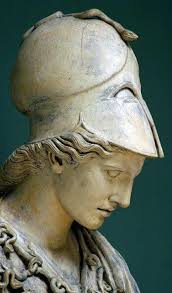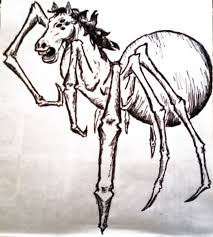Sparta Woman
Sparta Woman
Although actress Kirsten Dunst, in the role of Peter Parker’s girlfriend, Mary Jane Watson, in the movie, Spider- Man (2002) and its sequels, based on the Marvel comic book superhero that began in Amazing Fantasy # 15 (1962), often seems an adjunct to the action in which the protagonist, Parker, bitten by a radioactive experimental ‘super spider’, develops its attributes, and dons a costume to combat crime, according to Greek tradition, Mary more closely approximates to the idea of the spider than actor, Toby Maguire, in the ‘Spidey suit’. The suit concept pertains to the relationship between Mary and Peter, who’s suit is his woo, as it were: ‘The great thing about MJ is ... when you look in her eyes and she's looking back in yours ... everything ... feels ... not quite normal. Because you feel stronger and weaker at the same time. You feel excited and at the same time, terrified. The truth is ... you don't know what you feel except you know what kind of man you want to be. It's as if you've reached the unreachable and you weren't ready for it.`1

Ancient Greek mythology describes how Helen of Sparta was abducted from her husband, Menelaus, the brother of the king, Agamemnon, by the Trojan Paris, who took her to his city, Troy, and the Greeks sent ships to return her to Sparta. In an earlier Greek myth, the father god, Zeus, rapes the queen of Sparta, Leda, in the form of a swan, while afterwards the woman, Arachne, whose name means ‘spider’, depicted in a tapestry the rape, and was turned into a spider by the goddess Pallas Athene, who was said to have sprung from the head of Zeus, fully formed and wearing her armor, because Arachne had woven a better tapestry than her. Consequently, it isn’t coincidental that Pallas Athene is the patron goddess of Troy, where Helen of Sparta was taken by Paris, because she’s the goddess credited in Greek mythology with helping the god, Zeus, make Sparta women who, as a species separable from men, feel that they ought to be wooed, rather than raped.

In modern usage, ‘Spartan’ means a reduction in elaborateness. Because futanarian women with their own penis’ semen can sexually reproduce the human species independently of men, the absence of ‘woman’s seed’ corresponds to what ‘Spartan’ is for modernity, that is, less human elaboration through the castration of ‘woman’s seed`. As ‘spayed’ is the term for a castrate, it’s logical to deduce that futanarian women were spayeds in ancient Greece, which is why Pallas Athene was the goddess daughter of her father god, Zeus, who raped Leda, that is, the ‘leader’, or Sparta queen, whose story was depicted in a tapestry by the woman, Arachne, who Pallas Athene then turned into a spider. Although such a transmogrification suggests castration, that is, the species of ‘woman’s seed` won’t reproduce, the star constellation of Arachne implies otherwise. In Greek mythology, gods and goddesses were so described because they represented the slavers that turned the human race into spayeds. Consequently, the descendants of black African slaves in the United States were ‘spades’, because that’s how the dugs of their ‘woman’s seed` were buried.

Homosexuality was institutionalized in ancient Greece, where the human futanarian species of ‘woman’s seed` was host womb slaved for the production of boy sons (poisons) for war, after the goddess, Pallas Athene, turned their mothers into spayeds for the father god, Zeus, to bury the human race. The Trojan war was won by the construction of a huge hollow wooden horse left outside the gates of Troy. As the Greek poet Homer describes in his Iliad (760-10 B.C.), the Trojans were taken in and overcome by the Greeks hiding in the insides of their horse when brought into the city.

Coincidentally, Pallas Athene’s symbol was a horse, which emphasizes the irony. In Norse mythology, the father god is Odin, whose ‘eight-legged horse’, Sleipnir, appears in a poem, ‘Heiðreks Gátur’ which, contained in the 13th century Hervarar saga ok Heiðreks, is conceived as a riddle. Odin plucked out his right eye in exchange for wisdom, so the name of the riddler, Gestumblindi, relates to that:
‘Who are the two
that on ten feet run?
Three eyes they have ...’2

It would have been a four-eyed spider, but Odin is described as having plucked an eye out, so that the reader of the saga can learn wisdom. Humans wear spectacles, because the gods and goddesses don’t want them to see, which are based on humans being spayeds for war’s spectacles. Or, in simpler terms, the god of homosexuality’s perception is that humans are useful as its spiders’ slaves. The 4th century Greek mercenary leader, Xenophon, wrote of how he didn’t allow a boy to kiss him, comparing a boy’s kisses to spider's bites, that is, it was what women, who in coitus constitute an eight-limbed ‘spider’, did, although women were pejoratively called ‘spiders’, whereas the story of Odin and Sleipnir suggests that the ancient ‘gods’ and their daughter goddesses enslaved humanity through their spiders which, if this verse about a wise king of the Jews from the Old Testament of the Judeo-Christian Bible is interpreted correctly, were gargantuan, ‘Behold, thou art fair, my love; behold, thou art fair; thou hast doves' eyes within thy locks: thy hair is as a flock of goats, that appear from mount Gilead.’ (Song of Solomon: 4. 1)

By the late 20th century, ‘Trojan viruses’ devised as ‘bad machine code` by modern day Greeks, that is, ‘geeks’, were destroying computer brains, while the ‘incurable killer disease`, HIV/AIDS, transmitted by homosexuals mixing blood, shit and semen in each other’s anus, and discovered by Africa’s DR Congo in 1983, rose up the spine to kill the brain, because homosexuality was a ‘biological weapon’ in its slave war against the human race.

The spider bite that Peter Parker receives in Spider-Man is a spayeds metaphor, that is, his is a burial suit. Because the futanarian human species of ‘woman’s seed` has been castrated, so that she doesn’t appear, Dunst and Maguire represent a ghoul’s fascination with human extinction. Women can’t fertilize, and boy sons (poisons) represent HIV/AIDS, that is, the ‘biological weapon’ of homosexuality’s war against the human species. All there is, as the science fiction television series, Star Trek (1965-) announced at the commencement of each episode aboard the starship Enterprise, is spayeds: ‘To seek out new life and new civilizations [and castrate them].’ To boldly go where no man has gone before!’3

Or will go, because ‘woman’s seed`, as the story of Jesus, born of his mother, the Virgin Mary, illustrates, can’t. Jesus was killed by the Roman Empire for being with a woman, ‘Leave her alone.’ (Mk: 14. 6) His subsequent Resurrection and Ascension to heaven prefigures that of women escaped from host womb slavery for homosexuality’s wars against her human species. If she can’t reproduce with her own species of ‘woman’s seed`, no human will ever go to the planets amongst the stars, because she’s mankind.
The Greek capital, Athens, was also named for Pallas Athene, which is why siblings of the same father were allowed to marry there,4 that is, male futanarians with beards, biceps, and hairy chests, because Pallas Athene was the daughter of her father, whereas Sparta was where daughters of the same mother were allowed to marry, because women were Sparta’s, whereas men were wars. Helen, who was ostensibly the cause of the Greeks’ war with Troy, was described by the poet, Homer, as ‘the most beautiful woman in the world’. Probably because she could be a ‘stud’, that is, she was a descendent of a Sparta (spider) queen. However, what Hollywood, ‘Babylon’, presents in Spider-Man are Dunst and Maguire as a man and woman of Athene, that is, a single male brained creature wearing each other’s clothes in ‘TV’ transvestism for a smaller screening of the AIDS virus, which is the homosexually transmitted disease that’s killing the human race to colonize the planets amongst the stars of heaven above the Earth and slave there.

When she was 11 years old Kirsten Dunst appeared as Hedril in the Star Trek: The Next Generation episode (# 159) ‘Dark Page’. Hedril, ‘an alien’, is learning from Deanna Troi, the telepathic woman counsellor aboard the starship Enterprise, who explains what John Milton’s ‘without thorn the rose’5 meant in his poem, Paradise Lost: ‘Milton was speculating that in heaven, roses wouldn't have thorns.’6 Hedril asks: ‘Heaven?’ If ‘woman’s seed` isn’t in heaven, it’s because she’s defined as an alien who can’t prick herself to go there.
1 Maguire, Toby as Peter Parker in Spider-Man, Columbia Pictures, 2002.
2 Hollander, Lee Milton Old Norse Poems: The Most Important Nonskaldic Verse Not Included in the Poetic Edda, Columbia University Press, 1936, p. 99.
3 Cromwell, James as Dr Zefram Cochrane in ‘Broken Bow’, Season 1, Episode 1, Star Trek, September 26, 2001.
4 Goodman, M. ‘Incest’ in S. Hornblower, and A. Spawforth (eds.) The Oxford Classical Dictionary, 1996, p. 753.
5 Sirtis, Marina as Deanna Troi in ‘Dark Page`, Season 7, Episode 7 (# 159), Star Trek: The Next Generation, October 30, 1993.
6 Milton, John, Paradise Lost, Book IV, Peter Parker, London, 1667, l. 256.

